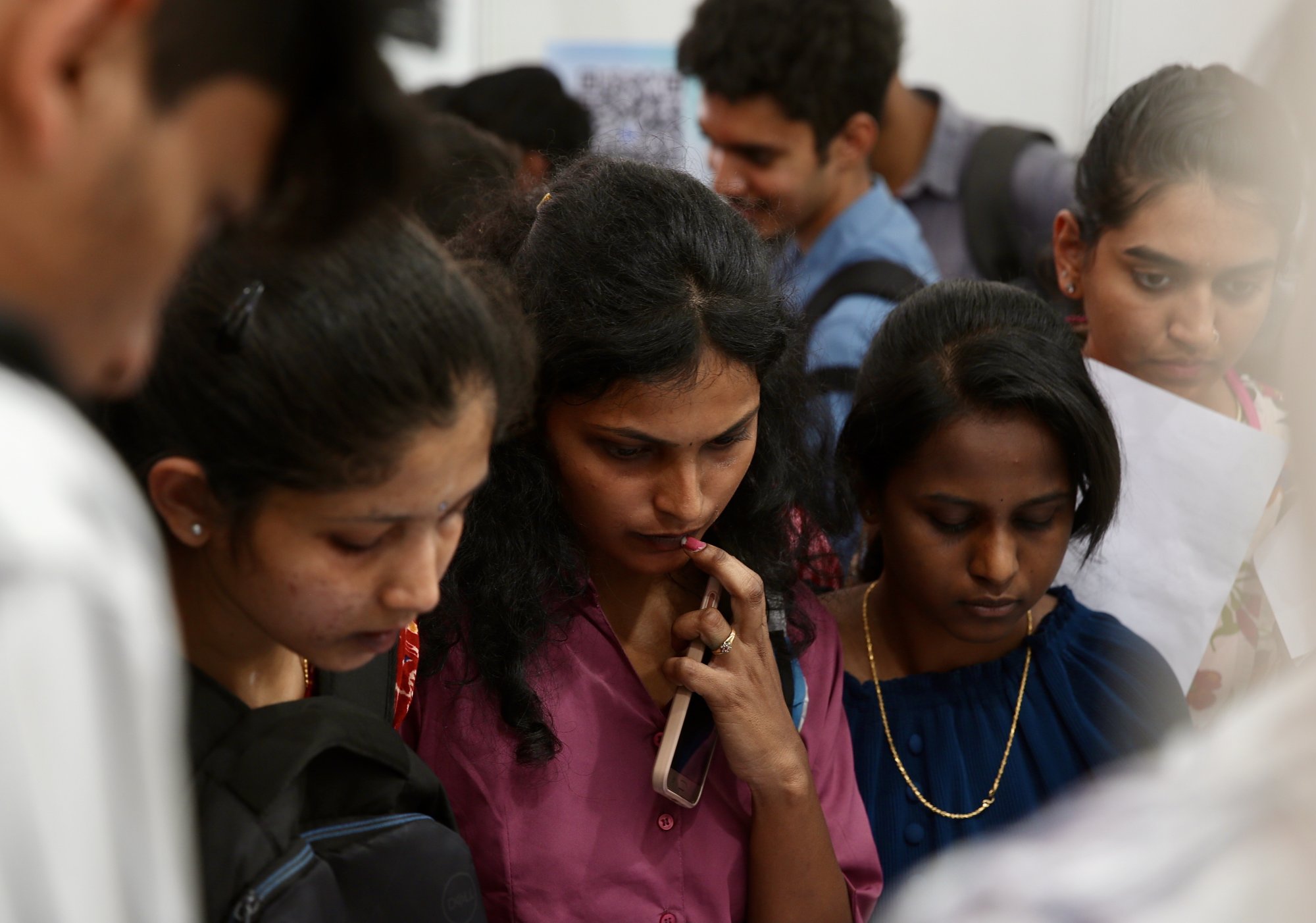Indian woman’s ‘extremely creepy’ online job hunt sparks concern about cyber harassment
Women say they are subjected to inappropriate behaviour during online work interviews, with one even getting molested

The “extremely creepy” experience of a female online job applicant in India has underscored growing cases of cyber harassment on the labour market despite strong laws, after the woman said she was questioned about her marital status by a recruiter and asked to send over a photo of herself.
She shared her ordeal on Reddit last month, expressing how the encounter left her “disheartened”.
The post sparked several online comments, including one user who shared her own experience of how she “kept ignoring the red flags because I was so desperate for the job”, resulting in her getting molested and having to run for her life.
Another user advised the woman in the latest case to file a complaint against the company and recruiter, saying “he’s probably done it before and he’ll do it again”.
The trend of online recruitment that increased during the Covid-19 pandemic has also brought to the fore different forms of harassment for women not only in India but also other parts of the world. Cyber abusers are lulled by a false sense of anonymity, with many being unaware that they can be tracked down digitally, experts warn.
Millions of women worldwide encounter online abuse such as sexual harassment and stalking, which needs to be tackled not only through laws and addressing data gaps, but also efforts to establish a culture of respect and empathy, according to a UN Women report in February this year.

“Women being interviewed online for a work-from-home job do often complain of inappropriate questions and lascivious comments being made by the interviewer,” said Niharika Karanjawala-Misra, principal associate at Karanjawala & Co, an Indian law firm.
“This behaviour can continue into the work relationship as well, such as through requests to view one’s social media presence, sending inappropriate content [often in the guise of jokes] or making lewd comments and sexual advances,” she added.
These incidents are occurring because an online setting with just the applicant and interviewer is often more informal and isolated than a physical workplace where there will be other workers around, according to Karanjawala-Misra.
“In such a scenario, not only are instances of sexual harassment made more possible, they are often taken less seriously, as they are not instances involving physical force,” she said.
Victims could file complaints to cybercrime cells under several provisions in Indian laws, such as the 2013 Sexual Harassment of Women at Workplace (Prevention, Prohibition and Redressal) Act and the Information Technology Act, which covered the process for online recruitment, she said.
“While the legal provisions do provide a deterrent to such offences, the reality is that the majority of victims do not come forward and file a complaint,” Karanjawala-Misra said.
India enacted the POSH Act-Sexual Harassment of Women at Workplace (Prevention, Prohibition and Redressal) in 2013 to protect women from sexual harassment. It mandates that every organisation with more than 10 employees set up a panel to inquire into such complaints.
Even a non-employee such as a jobseeker can file a complaint against an employee of an organisation under the law, according to Aparna Mittal, founder of Samana Centre for Gender, Policy and Law.
“However, what happens is that people get so put off that they don’t want to engage with the company any more even to file a complaint. On the other hand, some people are so underprivileged that they are forced to take up the job in spite of such sordid interactions,” Mittal said, noting that some were not even aware of their legal rights.
Complaints alleging sexual harassment in the workplace have increased significantly, rising by 79 per cent in India’s top 10 private companies over a five-year period between the financial years 2020 to 2024, according to an analysis of annual reports by ETHRWorld.
According to Karanjawala-Misra, companies could put in place measures to combat rising instances of workplace sexual harassment, such as sensitivity training for all employees, ensuring HR personnel be present during online interviews to curb instances of inappropriate behaviour, and recording online interviews for later review.

Experts note that about 30 per cent to 40 per cent of corporate India adhere to laws on prevention of sexual harassment, and tend to go above and beyond requirements because they want to prioritise good governance and workplace safety.
“But there are also thousands of companies who still don’t have any clue or any willingness in this area,” Mittal said.
She pointed out instances of sexual harassment during job interviews, such as applicants being asked about their marital status or whether they had a child, saying these questions had no bearing on the job position.
Asking jobseekers for intimate pictures or seeking a meeting in an intimate setting would fall into the same category, she noted.
Cyber harassment of women is not limited to just online job interviews. A 2023 survey by LocalCircles revealed that eight in 10 urban Indian women using the internet for a range of activities struggled with online harassment, abuse and trolling, and said action needed to be taken to make the internet safer.
However, new forms of cyber harassment are increasing because they are easy to carry out through anonymous accounts, including trolling of people online, experts say.
“Only yesterday, I was seeing a post of a [social media] influencer turned entrepreneur who has launched a line of apparel and there were all kinds of atrocious and obscene comments made by trolls – about people’s body shapes,” Mittal said.